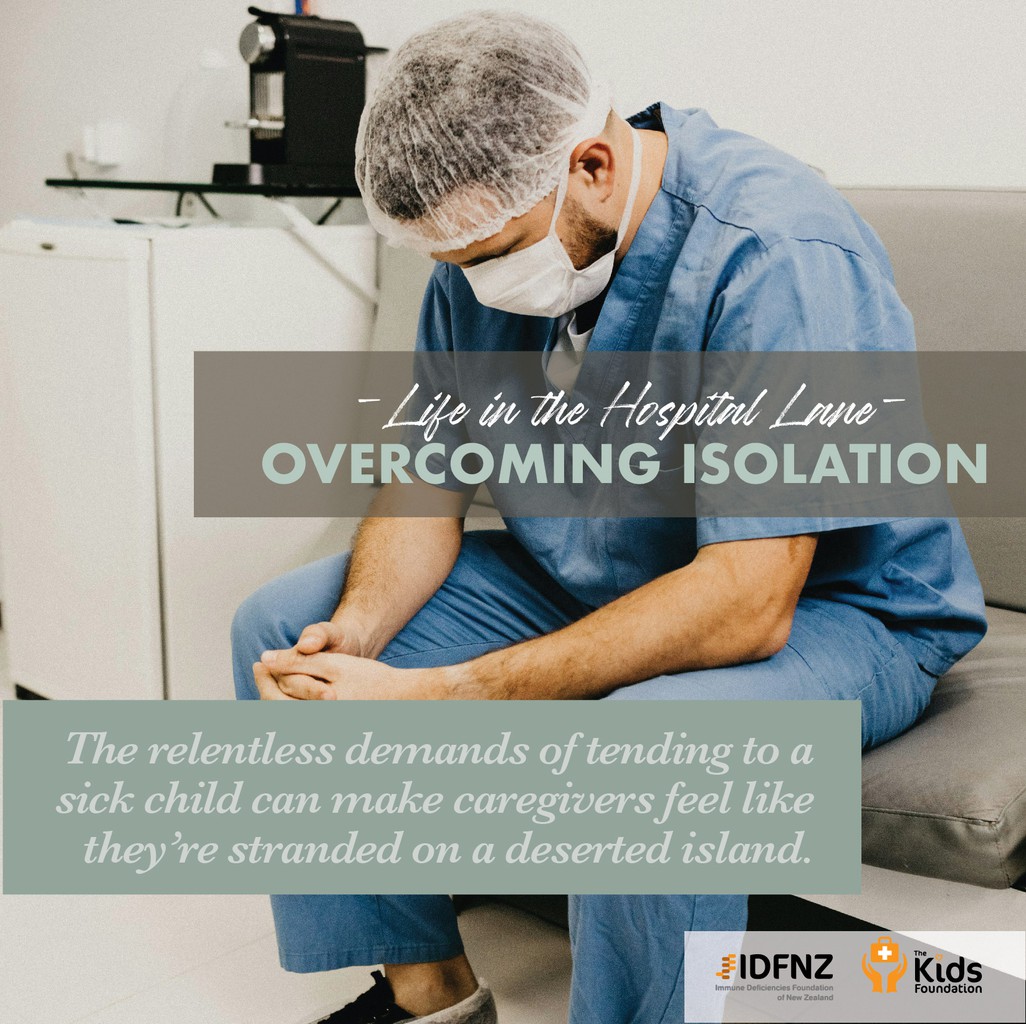Life in the Hospital Lane – Overcoming Isolation - Part 1
Mon Aug. 26th 2024

The relentless demands of tending to a sick child can make caregivers feel like they're stranded on a deserted island.
Who could imagine that caring for your beloved child day in and day out could lead to an overwhelming sense of loneliness. The relentless demands of tending to a sick child can make caregivers feel like they're stranded on a deserted island, disconnected from the world around them. Caring for an unwell child isn’t just a responsibility; it’s an odyssey filled with highs and lows. The chaos of hospital visits, medication schedules, and the emotional burden leaves little time to connect with friends and family. Loneliness is very real, and it has a big impact on your life. Prolonged isolation can drain you emotionally, making life seem bleak and pointless. It can also lead to physical symptoms, including aches and pains, sleep problems, difficulties with attention and memory, and a weakened immune system. The truth is, that caregiver isolation is incredibly common, and it can stem from the following reasons:
Being mentally and/or physically exhausted, making socialising seem impossible.
Struggling with guilt over taking time for yourself away from the child you're caring for.
Feeling resentment towards others whose lives seem less complicated.
Being aware of these reasons is the first step in overcoming isolation. It's important to address and combat feelings of isolation for the sake of your overall well-being and for the sake of those you care about. There are many ways for parents to maintain vibrant social and spiritual connections while still embracing the remarkable journey of caring for a child.
Reframe your isolation
Begin your day with a positive mindset, even if you've been feeling low lately. Changing your perspective on whatever situation you may find yourself in can make dealing with feelings of loneliness easier. Loneliness arises when your need for social interaction and human connection isn't met, but it varies from person to person. For instance, if you typically spend evenings surrounded by friends and loved ones, you might feel out of sorts when there have been days on end spent bedside in the hospital. You miss the chatter and the connection. You may even feel a sense of isolation when returning to an empty house despite having many strong friendships and family around you. Conversely, if you enjoy your own company, seeing one friend weekly might be sufficient. While close relationships are essential for thriving, research suggests that some solitude is also crucial. Time spent alone allows for self-discovery, creative thinking, and self-reflection. It fosters mindfulness, potentially reducing anxiety and depression. So, when you feel isolated or lonely, try to embrace it. Put on some music and rediscover a love for reading, play an old game of solitaire, or simply sit and tune into your feelings and aspirations. Embracing solitary moments can help you reap their benefits and turn them into opportunities for growth. Whatever you choose to do, finding ways to make the most of your alone time can help you lean into solitude and use it to your benefit.


Watch self-talk and practice gratitude
Your internal dialogue takes an enormous toll on your mood. Pay attention to your thoughts. If they are consistently negative or loaded with worries and anxiety, try intentionally shifting your mindset. Find three positive things to be thankful for and concentrate on those. When the negativity creeps back in, think of three more. It will take some effort in the beginning but can eventually become second nature. It may feel difficult to notice positive things in your life when you feel isolated but taking a few minutes to practice gratitude each day will help you feel better. It may be as simple as thinking of something small you enjoyed recently, like seeing the sunrise or eating a freshly baked muffin. If you want a grateful attitude to ‘stick’ you could even try:
Writing down a few things you’re grateful for each day
Remember a few positive moments from your day
If you feel grateful to someone, tell them!
Relive a happy experience from the past in your mind
Take a break from social media
While social media often seems like an appealing way to maintain connections with loved ones, it can increase feelings of isolation. A friend’s happy, carefree post can give the impression they don’t care about what you’re going through. When you’re alone, seeing others spending time with family and friends can also sting. Of course, social media never shows the whole picture, so you can’t know what your loved ones feel without asking. It’s also worth considering some of those posts might serve as someone else’s approach to countering loneliness. Some research is beginning to show that comparing yourself to others on social media may be linked to increased feelings of loneliness. Social media can be a great tool for staying connected and feeling like you’re still a part of your friend's lives, even though time and distance separate, but if you find that you feel more distant, more ‘low’ after a scroll through Instagram or Facebook, it never hurts to close those apps and connect with a phone call or text instead.
